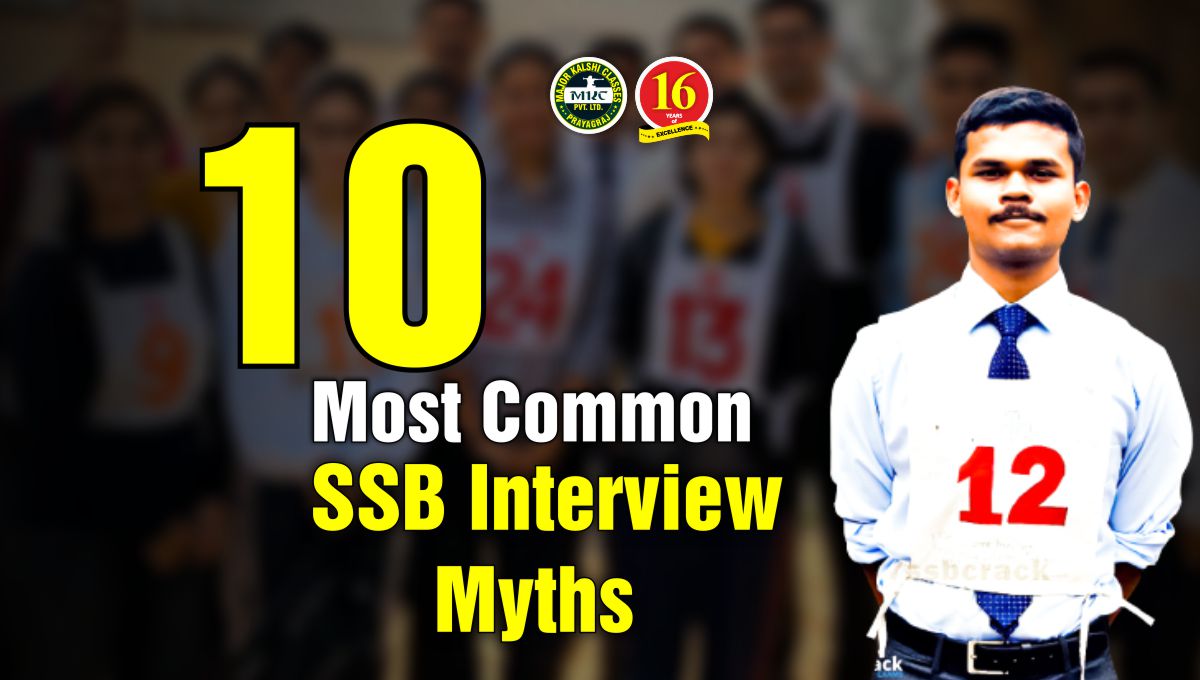10 Most Common SSB Interview Myths
The Services Selection Board (SSB) interview is a crucial step for candidates aspiring to join the Indian Armed Forces as officers. As this selection process carries immense significance, it often becomes a subject of various myths and misconceptions. These myths can create unnecessary anxiety and confusion among candidates, potentially impacting their performance. In this article, we aim to debunk the ten most common SSB interview myths to help candidates approach the process with confidence and clarity.
10 Most Common SSB Interview Myths
Table of Contents
It is essential for candidates to dispel the common myths surrounding the SSB interview and approach it with a clear understanding of the process. The key to success lies in presenting oneself genuinely, confidently, and demonstrating officer-like qualities. Remember, the SSB interview is not just a selection process; it is an opportunity to showcase your potential to serve the nation as an officer in the Indian Armed Forces.
Myth 1: SSB is Only for Those with a Military Background
Fact: The SSB interview is open to candidates from all educational backgrounds and streams. While knowledge about defense-related topics may be helpful, it is not a prerequisite. The selection is based on the candidate’s personality, aptitude, and potential to become an officer, rather than their prior military knowledge.
Myth 2: Extroverts have an Advantage over Introverts
Fact: The SSB interview assesses individual qualities and not extroversion or introversion. Candidates are evaluated based on their officer-like qualities, leadership potential, and ability to work as part of a team. Both extroverts and introverts have an equal opportunity to showcase their strengths.
Myth 3: Dressing in Military Attire Improves Chances of Selection
Fact: The SSB interview is not about dressing in military attire, but about presenting oneself smartly and confidently. While appropriate attire is essential, it is the candidate’s personality, behavior, and responses that carry more weight in the selection process.
Myth 4: Lengthy Narration is Better for TAT and WAT
Fact: The Thematic Apperception Test (TAT) and Word Association Test (WAT) in the SSB interview focus on quick and spontaneous responses. Lengthy and overthought narrations may not necessarily be advantageous. Simple, honest, and coherent responses are valued more.
Myth 5: Only Candidates from Sainik/Military Schools Get Selected
Fact: While candidates from Sainik/Military schools may have some exposure to the military way of life, it does not guarantee selection. The SSB interview evaluates each candidate on their individual merit and potential to become an officer, irrespective of their educational background.
Myth 6: SSB Interview is Like Any Other Job Interview
Fact: The SSB interview is unlike regular job interviews. It assesses a candidate’s personality, leadership, and problem-solving skills through various tests, group discussions, and outdoor activities. It aims to evaluate their suitability to serve as officers in the Indian Armed Forces.
Myth 7: Only Physical Fitness Matters in SSB
Fact: While physical fitness is essential for any career in the military, the SSB interview primarily focuses on a candidate’s mental and intellectual abilities. Qualities like initiative, communication skills, decision-making, and teamwork are equally crucial.
Myth 8: Coaching is Necessary for SSB Selection
Fact: Coaching can provide valuable guidance and practice, but it is not a prerequisite for success in the SSB interview. Candidates who understand the process and work on developing their personality and officer-like qualities can perform well without formal coaching.
Myth 9: Sharing Personal Stories in Psychological Tests Improves Chances
Fact: The SSB interview seeks genuine responses, and candidates should avoid fabricating or sharing personal stories that are not true. The assessors are skilled at identifying honest and authentic answers.
Myth 10: SSB Interview is All About Intelligence Quotient (IQ)
Fact: The SSB interview assesses the entire personality of a candidate, which includes intelligence, emotional quotient (EQ), and officer-like qualities. While intelligence is vital, other attributes like initiative, determination, and the ability to handle pressure are equally significant.








